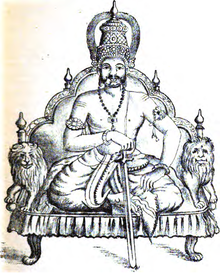Valiant Hindu Kings – Vikramaditya & Daughters of King Dahir
Introduction
Hindu Dharma has a glorious past of Righteous kings who personified fearlessness and valour. Hindu kings were devoted to Righteousness and were always keen on the all round progress of their people. As per the saying ‘Raja Kalasya Karanam’ meaning the king himself is responsible for the times, the kings abided by Righteousness and hence their people were also happy, prosperous and of good moral conduct. The kings would rule under the direction of their Guru. They would patronise many artists and would wholeheartedly support the arts. They would never attack others except in self defence even though they were capable of conquering the entire planet on the basis of spiritual power. Similarly in the later part of their life they would hand over the reins of their kingdom to their heir and would perform spiritual practice further by voluntary acceptance of Vanaprasthasrhram.The remembrance of such great kings who have created the glorious history of Hindus is an incessant source of inspiration. Every incident in the life of these great heroes is a witness to their brilliant capability. Some special events in the lives of these bright kings have been given ahead to awaken the extinct pride in the minds of Hindus about their religion, nation and culture and also to create a new urge and enthusiasm in them to defend their religion, nation and culture. It is our prayer at the feet of God that Hindus should ready themselves for any type of assault against them by taking a cue from this history.
King Vikramaditya
King Vikramaditya ruled over Ujjain. In his kingdom, all law and order arrangements were based on the Dharmashastras and were excellent. In order to ensure ideal rule, in his cabinet of ministers he had nine important ministers who were truly gems.His kingdom extended up to Arabastan and he was a generous king who always looked after the welfare of his people. Vikramaditya’s father was Mahendradutt, mother was Soumyadarshana and brother was Barthuhari. Vikramaditya had defeated the rulers of Arabastan and had added that region into his kingdom. This victory is beautifully described in a poem by “Barham Bin Soi”. Of the sixty years that Vikramaditya ruled, he spent twenty five years in wars. He was an ideal ruler who always ensured that everyone benefitted from his decisions. He was a generous ruler who always thought of the welfare of his people and ruled accordingly. Even though he was a follower of the Shaiva religion, he always treated all religions with equal respect. In his cabinet, his nine gems were Dhanvantri, Shapanak, Amar Singh Shanku, Vetal Bhatt, Kharpar, Kalidas, Varahmihir and Varruchi.
– Pujya Parshram Madhav Pande Maharaj, Akola
Nine Gems of his Cabinet
1. Kalidas: Author of the great epic, ‘Shakuntala’, great poet, dramatist and the most prominent scholar of Sanskrit language.2. Amarnath: Author of ‘Sanskrit Amarkosh’
3. Shapanak: Prominent Astrologist who had achieved mastery in Astrology.
4. Dhanvantri: A Doctor who had achieved mastery in the science of medicine; one who was an expert in diagnosis and one who could prescribe different treatments for a single disease.
5. Varruchi: Expert Linguist and an expert in Grammar
6. Varahmihir: Author of World famous epic, ‘Bruhatsahita’ and mastery in Astrology.
7. Ghatakpar: Expert in sculpture and architecture.
8. Shanku: Expert in Geography (This name is even well known today in the field of geography)
9. Vetalbhadra : Expert in black magic & tantric sciences
This is an example of how the Bharatiya rule was complete in all respects with peace and prosperity existing everywhere in the kingdom when there were no external attacks.
Muslims who were aggressive against Hindustan and Hindus fought back against this aggression.
Kings and Princess
Daughters of King Dahir: ‘For thousands of years no one even dared to look at Bharat with a view to conquer it. But in 711 AD there was an aggressive and deadly attack on Sindh province. At this time, Sindh was ruled by Dahir Raja. The king was killed. The Queen performed ‘Johar’ and ended her life. The palace was destroyed. The attackers were surely not braver than us. Maybe they had better weapons, but the terror which they created had no equal. Armed warriors entered the small towns and villages. Earlier battles were fought on the battlefield. Warriors fought against warriors. However these aggressive and cruel warriors killed innocent women, children and old people who were in their houses. They destroyed temples and the idols residing in the temples. They destroyed schools. They raped young women. The way they treated those who were their victims, was utterly cruel. That man can be so cruel was unprecedented and unknown to Bharatiya culture. This kind of demonic aggression left the entire society afraid and terrified. As a result the aggressors found literally no opposition.In addition, since there was excessive adherence to the concept of non violence, even the army too was reluctant to fight. Sindh was defeated. Blood sucking, man-eating demons were dancing on the blood filled land and creating a ruckus.
In this way unfavourable anti-Hindu youth entered the western boundary of Bharat. In these adverse circumstances, our good qualities worked against us as they turned out to be our failings.’ – Prof. S. G. Shevde (Bharatiya Sanskruti, Page Nos. 35 & 36)
Salutation to daughters of King Dahir who avenged the insulting defeat of Sindh by killing Mohammad Bin Qasim !:
‘Finally the Hindu kingdom of Dahir was destroyed. He had two daughters, Suryadevi and Parimaladevi who were sent to Baghdad as a gift for the Khalif. Our culture is one which treats a woman as a mother and here was another culture, which sent girls to their Dharma Guru for appeasement and enjoyment, which was a disgrace to mankind ! But both daughters of Dahir were very brave. They gained the confidence of the Khalif and he began to trust them. As they were given as gifts to Khalif, they were unable to prevent physical violation of their bodies but just see what they did do! They sent a letter to Mohammad Bin Qasim’s generals bearing the stamp and signature of the Khalif. The letter contained an order – ‘Put Mohammad in a leather bag, seal the bag and send it here’. The order was from the Khalif. The generals followed the order word to word; they put Mohammad alive in a letter bag, sealed the bag and sent it to Baghdad on a ship. When the ship reached Baghdad after 10-12 days, Mohammad Bin Qasim’s corpse had decayed to such an extent that worms had begun to devour the corpse. The decaying smell was unbearable.
The Khalif investigated as to ‘Why was he sent to him like this?’ The two girls then told the Khalif, “We sent a letter bearing your signature and stamp. We have taken revenge on the demon who inflicted untold misery in our kingdom. We have done this. We feel proud of what we have done. We have fulfilled our national duty. We are ready to face any consequences for this action.”
An enraged Khalif tied the hair of the two girls to the tails of horses and made the horses run throughout Baghdad. The girls were being kicked by the horses and their bodies were being stripped of its skin in the process. Their hair was being pulled and their heads were dashing against the knees of horses. Except for the bloodied heads, both bodies were stripped and cut into pieces and were being dropped on the road. But the two girls, who were proud of having avenged the insult to their kingdom, did not have a single tear in their eyes as they embraced martyrdom. (When Bharat gained independence, statues of these two girls should have been erected on the Sindh border.)’ – Prof. S. G. Shevde











